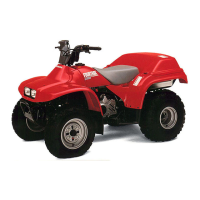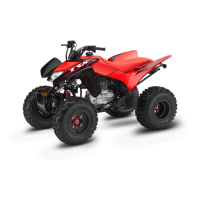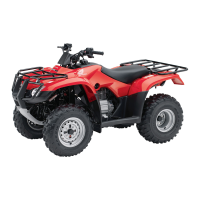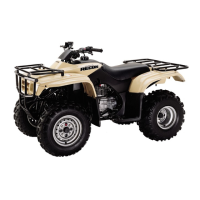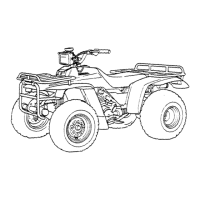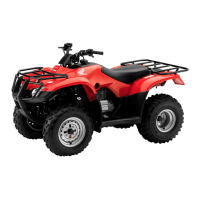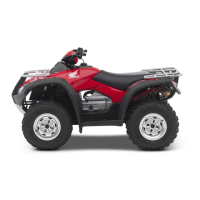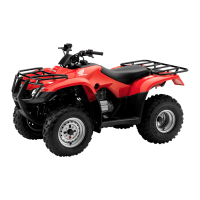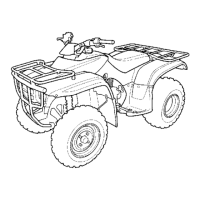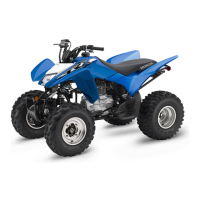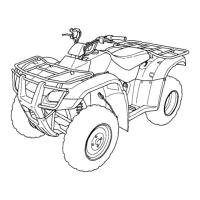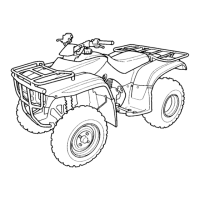Do you have a question about the Honda TRX200SX and is the answer not in the manual?
Vehicle for operator only, off-road use only, and emphasis on reading the manual.
Introduces the manual as a guide for operation and maintenance, advising dealer consultation.
Covers pre-ride checks, obeying laws, responsible riding, and situational awareness.
Advises on wearing helmets, face shields, boots, gloves, and full-coverage clothing.
Warns against altering equipment, covering safety, legality, and exhaust requirements.
Cautions about accessories/cargo impacting stability and speed; recommends reduced speed.
Specifies maximum loads for front/rear carriers and total vehicle capacity.
Details tow weight, tongue weight, and combined weight limits for trailer towing.
Explicitly states the TRX is not designed for passengers on carriers or elsewhere.
Identifies and illustrates key external parts on the front and handlebars using numbered labels.
Identifies and illustrates key external parts on the rear and controls using numbered labels.
Explains the location and importance of frame and engine serial numbers for parts ordering.
Details the function of the ignition switch in different key positions (OFF, ON).
Explains the reverse indicator lamp and the engine stop switch functionality.
Describes the operation of the starter button and headlight/dimmer switches.
Details the owner's manual and storage compartments, including cargo limits.
Explains the use of the helmet holder and steering lock, with safety warnings.
Describes the function of the throttle lever and the rear brake/parking brake lever.
Explains the reverse selector knob and the neutral indicator lamp/indicator.
Details the function of the decompressor lever and the choke knob for starting.
Explains how to use the gearshift pedal for upshifting, downshifting, and engaging reverse.
Details the location of the fuse holder and warnings about using correct fuse ratings.
Explains the ON, OFF, and RES positions of the three-way fuel valve.
Details fuel tank capacity, refueling procedures, octane requirements, and cap lever function.
Describes how to check the engine oil level using the dipstick and the importance of maintaining it.
Recommends specific oil types and discusses recommended viscosity based on temperature.
Lists tire sizes, brands, recommended pressure, and maximum pressure.
Explains that the battery is sealed, and provides storage instructions.
Recommends using a plug method for temporary repairs and carrying a repair kit.
Lists essential checks to perform before riding the TRX, covering fluids, brakes, tires, etc.
Outlines steps before starting, including level surface, parking brake, fuel valve, and neutral gear.
Details starting steps for normal and high air temperatures, including choke usage.
Covers starting in low temperatures and using the recoil starter if the electric starter fails.
Provides steps to clear a flooded engine by managing fuel and ignition.
Advises on proper break-in to ensure engine longevity, avoiding high RPM and sudden acceleration.
Covers general riding tips, avoiding wheelies, foot placement, and gear shifting.
Details how to safely ride the TRX in reverse, emphasizing caution and control.
Explains how to lean and shift weight for effective turning, especially in off-road conditions.
Discusses handling skids, improving control in mud/snow, and caution on slippery surfaces.
Provides guidance on climbing hills, including body positioning and avoiding sudden power application.
Covers safe hill descent techniques and warns against turning on slopes without prior practice.
Advises on descending hills directly downhill, using low gear, and avoiding front brake use.
Explains how to traverse slopes by leaning uphill for balance and stability, with caution on loose terrain.
Details safe water crossing, avoiding intake wetness, and testing/drying brakes afterward.
Instructions for cleaning front brakes after riding through mud, with cautions on water pressure and temperature.
Explains air-fuel mixture changes and potential performance reduction at high altitudes.
Steps for safely parking the vehicle, including shutting off systems and applying the parking brake.
Lists maintenance items like fuel line, strainer, throttle, choke, spark plug, and engine oil with service periods.
Lists maintenance items like drive chain, brake system, clutch, suspension, and fasteners with service periods.
Lists the tools provided in the kit for routine maintenance and simple repairs.
Details the steps for changing engine oil, including draining, refilling, and level checking.
Explains how to remove, clean, and reinstall the engine oil strainer screen.
Details the procedure for removing, cleaning, and reinstalling the engine oil centrifugal filter.
Provides instructions for cleaning the fuel strainer screen, with safety warnings.
Explains how to adjust idle speed and fuel mixture using throttle stop and air screws.
Describes how to modify the carburetor for high altitudes, urging dealer assistance.
Details steps for removing and reinstalling the carburetor for jetting changes.
Guides on inspecting spark plug wear, checking gap, and proper installation.
Provides instructions for cleaning and re-oiling the air cleaner element.
Explains how to access and set valve clearance, including timing marks.
Continues valve clearance adjustment, focusing on adjuster settings and lock bolt tightening.
Describes how to adjust the clutch for proper operation and testing.
Details front brake lever free play measurement and brake shoe lining inspection.
Explains front brake adjustment, fluid level checks, and reservoir filling.
Covers rear brake pedal free play, adjustment, and brake cable condition.
Details rear brake lever free play, adjustment, and wear indicator check.
Explains how to inspect, lubricate, and adjust the throttle cable free play.
Details checking and adjusting drive chain slack.
Provides instructions for cleaning the drive chain with kerosene.
Explains how to measure and adjust the free play of the reverse selector lever.
Outlines steps for preparing the TRX for extended storage to prevent deterioration.
Details steps for bringing the TRX out of storage, including oil change and battery check.
Explains how to drain fuel from the carburetor and remove the battery before transport.
Provides instructions for removing and installing the vehicle's wheels, including torque specs.
Lists overall dimensions, wheelbase, and dry weight of the TRX.
Provides capacities for engine oil, fuel, and engine specifications like bore, stroke, and displacement.
Details caster angle, trail length, tire sizes, and power transmission gear ratios.
Presents a detailed wiring diagram of the TRX's electrical components and connections.
| Brand | Honda |
|---|---|
| Model | TRX200SX |
| Category | Offroad Vehicle |
| Language | English |
